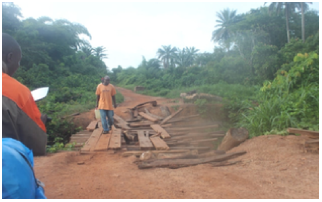By Williet Wonyenneh
FeJAL Newsroom Leaders Fellow
Zorgeipa in Nimba County, 24-year-old Prince Michael sits on the floor barefoot as he fries plantain chips harvested from his own farm.
“My sister, this is the only way we can benefit from the crops we plant because no way to take it to the market,” he said. “The place is far and no good road for cars to come in to transport our food to the market,” the 24-year old father of four disclosed.
In this town, which the town chief estimates to have about 2,000 population, the people plant, harvest and sell their farm produce amongst themselves. The distance from the town to the main street where vehicles are accessed is about 50 miles or 17 hours walk.
Agricultural produce is generated abundantly; however, a significant portion of these goods reportedly go to waste due to challenges in consumption, exacerbated by the absence of good farm-to-market road.
Thirty-two-year-old Cecelia Suah, a mother of three children, is currently expecting her fourth child. In the final trimester of her pregnancy, Cecelia walks a journey of 5 to 6 hours to the neighboring town to sell her agricultural produce. She does so to prevent them from deteriorating, as relying solely on the local community for purchases might not favor her. “I (am) pregnant, but I still have to help my husband to make farm because da (it is) from the farm we can get money to go hospital and do other things for ourselves,” she said. “And if we say the people in this town will buy all the market from us, we will end up losing everything,” she explained.
According to the 2022 Food Security, Nutrition, Livelihoods and Markets Assessment study conducted by the World Food Program (WFP), 70 per cent of Liberia’s 5.5 million population live on farming. However, 2.2 million Liberians, representing 47 per cent of the total households are food insecure, out of which 39 per cent are moderately food insecure and 8 per cent are severely food insecure, indicating that an estimated 416,000 people require urgent food assistance.
The study found limited application of modern technology, including, modern cultivation methods or machinery, inadequate storage facilities, and lack of access to market, as some of the factors contributing to food insecurity in the country.
This is evident by the challenges people in Zorgeipa town are faced with. Many farmers are now disengaging from agricultural activities due to the persistent issue of their produce spoiling before reaching the markets, primarily caused by inadequate road infrastructure and significant distances to travel.
Jerry Saye serves as the Youth Chairperson of the town. Despite lacking an alternative livelihood, Saye is relinquishing farming due to the inadequate farm-to-market road infrastructure, which hinders him from reaping the rightful rewards of his agricultural labor.
“I alone, when I make farm, my farm produce(s) plantain, eddo, cucumber, rice etc,” he disclosed. “But this year, I didn’t make farm because this bad road condition really frustrating our effort,” Jerry said discouragingly.
Nimba County is regarded as the “breadbasket” of Liberia owing to its substantial production of food and cash crops, including swamp rice, cassava, vegetables, plantain, yam, eddoes, and rubber, among others. However, Saye asserts that the region is losing its prestige as farmers are withdrawing from the practice. He argues that with enhanced roads connectivity, Nimba County could significantly bolster food security in Liberia, thereby reducing the reliance on imported food.
The challenges faced by the residents of Zorgeipa town represent merely a fraction of the hardship endured by people in rural communities throughout Liberia.
Agriculturalists in other nations are among the wealthiest people in the world, as indicated by a 2018 report from Herdsy, an arm of the next generation of farming technology based in the United Kingdom.
Nevertheless, in Liberia, the situation appears to be starkly different due to the significant obstacles that have engulfed farmers, impacting their livelihood.
Besides the absence of modern technological tools, or financial resources to support the efforts of impoverished farmers in Liberia, another significant obstacle is poor farm-to-market roads. This lack is widely believed to be the primary factor contributing to food insecurity in Liberia.
Ma-Yei Zuulu, age 56 and a mother of twelve has a request “we want the government (to) connect our roads and fixed our bridges, because when the road is good, we will be encouraged to keep making farm,” She said.
The female agriculturalist expressed her support for the current administration in Liberia due to its strong focus on agriculture during the 2023 presidential and legislative elections campaign. She emphasized the importance of President Joseph Boakai prioritizing the development of this sector.
Aside from including agriculture in his campaign promises as mentioned by Ma Yei, agriculture serves as the foundational pillar of the Boakai-led administration’s ARREST Agenda, which include Agriculture, Road Development, Rule of Law, Economic Growth, Sanitation, and Tourism.
This story was produced under the Female Journalists Association of Liberia (FeJAL) Women in Newsroom Leadership program.

